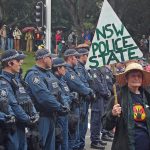Should Students be Suspended for Striking?

In September this year, nine-year old Brisbane school girl Harper Nielsen refused to stand for the national anthem at Queensland’s Kenmore South State School on the basis that is fails to recognise Australia’s Indigenous history.
The school demanded the year 4 student either stand or leave the building – but she refused to do either.
As a result, she was told she would have to sign a written apology or risk suspension.
The incident triggered Australia-wide debate, with members of the community polarised in their views.
Some saw Harper’s efforts as brave and honourable – a little girl acting upon her convictions and refusing to stand for unfairness. Others viewed it as disrespectful, including Senator Pauline Hanson who went so far as to say she’d give the girl a “kick up the backside.”
‘Take our futures seriously’
It seems students are once again finding their voices, like those during the era of popular dissent and social change in decades gone by.
Students across New South Wales are expected to converge on Martin Place in Sydney this afternoon to join a protest to demand action against climate change.
The students intend to call on politicians to “take our futures seriously and treat climate change for what it is – a crisis”.
But Prime Minister Scott Morrison will have none of it, stating “What we want is more learning in schools and less activism”.
A spokesperson for the NSW Department of Education has gone a step further and issued a warning, telling the media that students “enrolled at school are expected to attend that school whenever instruction is provided”, and that:
“Any student not in classes on a school day will be marked absent and may be subject to the school’s disciplinary code”.
The statement has raised concerns that students may be disciplined, or even suspended, for attending the protest.
Protect future generations
But many students are undeterred, taking to social media to voice views to the effect that without action on climate change, their futures and those of their children are at risk.
They are seeking action from parliament to protect the environment for future generations, and are disappointed by the lack of importance given by our politicians to the issue of climate change.
One teenage school girl told the media:
“It is as if he expects us to be completely apathetic towards the world and its issues until we reach the age of 18, where we are suddenly supposed to become well-informed voters with our own developed opinions.”
“Mr Morrison says that he does not support our schools being turned into parliaments. Well, maybe if the people in our Parliament listened to the science and took action like those of us in school, we wouldn’t have to resort to strike action like this.”
The ‘right’ to protest in Australia
There is no general right to protest in Australia.
In fact, participating in an ‘unlawful assembly’ is an offence under section 545C of the Crimes Act 1900 (NSW) which carries a maximum penalty of six months in prison and/or a $550 fine.
Section 545C states, “Whosoever knowingly joins an unlawful assembly or continues in it shall be taken to be a member of that assembly, and shall, on conviction before the Local Court, be liable to imprisonment for a term not exceeding six months or to a fine not exceeding 5 penalty units, or both.”
For any protest, rally or demonstration to be lawful, it must comply with the provisions of Part 4 (comprising sections 22 to 27) of the Summary Offences Act 1988 (NSW) which prescribes a range of requirements which must be fulfilled before an assembly can be considered ‘lawful’.
Section 22 defines a public assembly as any “held in a public place, and includes a procession so held”.
The definition of ‘public place’ for the purposes of the Part is “a public road, public reserve or other place which the public are entitled to use”.
Section 23 stipulates that a public assembly is authorised if:
(a) notice, in writing, of intention to hold the public assembly, addressed to the Commissioner, has been served on the Commissioner, and
(b) if a form of notice has been prescribed, the notice is in or to the effect of the prescribed form, and
(c) the notice contains the following particulars:
(i) the date on which it is proposed to hold the public assembly,
(ii) if the proposed public assembly is not a procession, a statement specifying the time and place at which it is intended that persons gather to participate in the proposed public assembly,
(iii) if the proposed public assembly is a procession, a statement specifying the time at which it is intended that the procession commence and the proposed route of the procession and, if it is intended that the procession should stop at places along that route for the purpose of enabling persons participating in the procession to be addressed or for any other purpose, a statement specifying those places,
(iv) the purpose for which the proposed public assembly is to be held,
(v) such other particulars as may be prescribed, and
(d) the notice specifies the number of persons who are expected to be participants in the proposed public assembly, and
(e) the notice:
(i) is signed by a person who indicates in the notice that he or she takes responsibility for organising and conducting the proposed public assembly, and
(ii) specifies the address of that person for the service on him or her of any notice for the purposes of this Part (which may include an address for the transmission of facsimiles or the sending of emails to the person), and
(f) the Commissioner has notified the organiser of the public assembly that the Commissioner does not oppose the holding of the public assembly or:
(i) if the notice was served on the Commissioner at least 7 days before the date specified in the notice as the date on which it is proposed to hold the public assembly–the holding of the public assembly is not prohibited by a Court under section 25 (1), or
(ii) if the notice was served on the Commissioner less than 7 days before that date–the holding of the public assembly is authorised by a Court.
Section 24 essentially provides that a person cannot be criminally prosecuted for unlawful assembly if they join a protest, rally or demonstration which complies with the above requirements.
Sections 25 and 26 give higher courts, such as the District or Supreme Courts, the power to decide applications regarding whether public assemblies will go ahead or not. However, it should be noted that applications can involve substantial legal fees, which may dissuade or prevent protest organisers from pushing ahead with events.
Evidently, protesting in NSW is not as simple as gathering like-minded individuals who are concerned about the existing state of political or social affairs, creating a few placards and taking to public parks or streets.
Rather, police in NSW wield enormous power when it comes to determining which public assemblies are allowed to proceed, and which are not.






